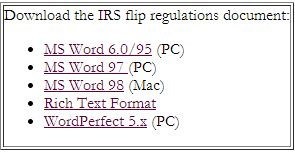
On December 9, 1998, the Internal Revenue Service released the long-awaited final regulations designed to provide additional guidance regarding charitable remainder trusts. The final regulations are generally more flexible than the proposed regulations published over a year ago. The IRS incorporated many of the changes suggested by practitioners in response to calls for input from the field. The big news included in this IRS release is the expanded availability of the so-called “flip trust.” A flip trust allows both net income and net income with makeup unitrusts to “flip” and become straight rate payout unitrusts following the occurrence of a specified event.
The original proposed regulations would have required that at least 90% of the assets contributed to the net income unitrust be “unmarketable” with the flip generally allowed only upon the sale of such assets. While the flip trust will still be very useful in dealing with assets which are not readily marketable, such as in cases where a charitable remainder trust is funded with real estate or securities that are closely held or not marketable for other reasons, the IRS dropped this requirement from the final regulations providing room for additional planning flexibility.
In a surprise move, the new regulations allow a net income trust to flip beginning in the year following the occurrence of any number of other events such as a marriage or birth. The primary requirement is that the so-called “triggering event” not be in the control of the donor.
Of particular interest to those concerned with existing net income unitrusts is the possibility of “flipping” pre-existing trusts into straight rate payout unitrusts. In order to take advantage of this provision, reformation proceedings in the appropriate court must be commenced by June 8, 1999. Interested parties should check with their advisors concerning the attractiveness of this planning option. Under the laws of many states, charitable beneficiaries must be a party to a reformation action, so the possibility of flipping an existing trust may result in many charities being notified of their interest in net income trusts in cases where they had not been previously notified. FASB accounting guidelines would require that such trusts be “booked” in the year of notification, so 1999 may result in additional reportable planned gift revenue as a result of the new regulations.
Other issues addressed in the new CRT regulations include confirmation that the four-tier payout rule applies to net income unitrusts and additional appraisal requirements for unitrusts funded with assets that are not readily marketable. Rules governing charitable trust payments after the end of the trust year were modified in a way designed to eliminate potential abuses of charitable remainder trusts such as the so-called “accelerated unitrust,” a scheme which also resulted in the 10% minimum remainder and 50% maximum payout rules that were introduced as part of the Taxpayer Relief Act of 1997.
As might be expected, the new IRS regulations are complex and will potentially have long-term impacts on both existing and future charitable remainder trusts.
Donors, charities, and others involved in the gift planning process will be well advised to study the regulations and to obtain the advice of their legal advisors concerning any provisions that may affect them.

